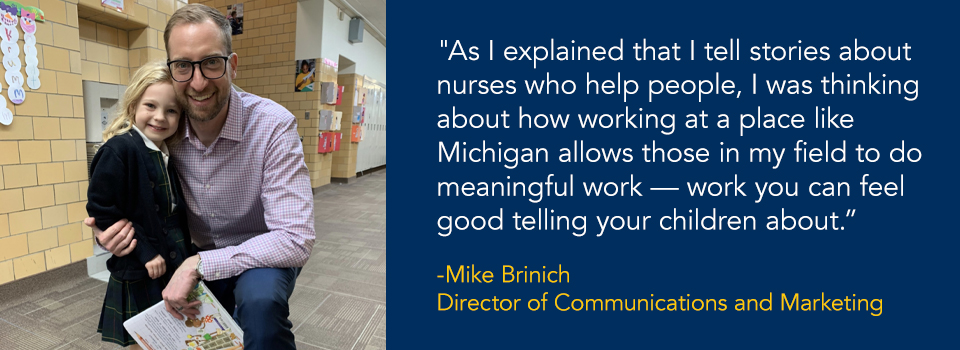Leading the Way: Mike Brinich, Director of Communications and Marketing

Standing in front of a kindergarten classroom on “Bring Your Dad to School Day,” last year, U-M School of Nursing Director of Communications and Marketing Mike Brinich was preparing to explain his job. But before he could answer, his daughter, Eloise, summed it up perfectly: “My dad tells stories,” she said. However, it was a follow-up question from another student that reaffirmed for Brinich why he chose to pursue a career in higher education.
“Her friend asked me what the story was about,” Brinich laughingly recalled. “As I explained that I tell stories about nurses who help people, I was thinking about how working at a place like Michigan allows those in my field to do meaningful work — work you can feel good telling your children about.”
 While his role at the School of Nursing involves much more than storytelling, Brinich did get his start in higher education eight years ago because he could take a complex idea and transform it into a story that can be easily understood by the general public.
While his role at the School of Nursing involves much more than storytelling, Brinich did get his start in higher education eight years ago because he could take a complex idea and transform it into a story that can be easily understood by the general public.
“Wayne State University was looking for someone who could take really complicated, technical research and convey its benefit to communities in Detroit and beyond,” said Brinich, who worked in private equity and sports entertainment before transitioning to the higher education. “I showed them some work I had been doing for an engineering and software company that humanized some very dry, technical ideas, and they took a chance and hired me without any previous experience in higher ed.”
During his tenure at Wayne State, Brinich helped promote research and clinical interventions that drove progress toward health equity in Detroit. In one of his first meetings with a researcher specializing in post-traumatic stress disorder in children, he knew he made the right choice to alter his marketing and communications career path.
“In my first month, I visited the lab of a researcher who investigated the effects of PTSD on the structure of a child’s brain,” Brinich said. “To this day, I remember her telling me that 41 percent of kids living in Detroit would experience trauma serious enough to cause PTSD. My first thought was that everyone needs to hear about this, and fortunately I was in was in a position to do just that.”
Looking back to when he first started working with researchers and clinicians in a university setting seven years ago, Brinich marvels at the rapidly changing pace of marketing trends. Competition for people’s attention gets tougher every day, but a basic principle he’s relied on throughout his 20 years in marketing and communications remains unchanged.
“Empathy has to be part of the foundation of whatever marketing activity you’re leading,” said Brinich. “Demographics and other data are important, of course. But if you don’t take the time to understand your audience and how your message will make them feel, your efforts won’t reach their full potential”
That potential is what energizes Brinich every day as he works at home 45 miles away from a once bustling Ann Arbor campus.
“When I interview our faculty and alumni about their incredible achievements that help people all over the world, I think, ‘If only we had more of you,’” said Brinich. “Then I’ll talk to a first-year student poised to become the next groundbreaking nurse or researcher, and I realize that ‘more’ are on their way to help.”





